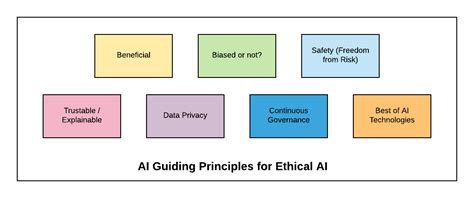The Need for Ethical Guidelines for Artificial Intelligence in Cryptocurrency
As the cryptocurrency world continues to grow, the use of artificial intelligence (AI) is becoming more widespread. While AI has the potential to transform various aspects of the industry, including transaction processing, market analysis, and risk management, it also raises important questions about its development and deployment.
Risks of Unregulated AI in Cryptocurrency
One of the main concerns surrounding AI in cryptocurrency is its potential lack of regulation. Without clear guidelines and oversight, AI systems can be used for malicious purposes, such as:
- Cybercrime: AI-driven phishing attacks or malware can exploit vulnerabilities in cryptocurrency exchanges, wallets, or other platforms to steal sensitive information or disrupt operations.
- Financial Mismanagement: AI-driven trading algorithms can prioritize profit over risk management, increasing market volatility and potentially devastating losses for investors.
- Identity Theft: AI systems can be used to create fake profiles or identities, allowing hackers to impersonate individuals and commit financial crimes.
Need for Ethical Guidelines
To mitigate these risks and ensure the responsible use of AI in the crypto space, regulators, industry leaders, and experts recommend the establishment of clear guidelines and standards for the development and implementation of AI systems. Some key principles include:
- Transparency: AI systems should be designed to provide a clear explanation of their decision-making processes and actions.
- Fairness and Impartiality: AI algorithms should be free from bias and ensure fair treatment of all parties, regardless of their experience or identity.
- Security: AI systems should prioritize security measures such as encryption and data protection to prevent unauthorized access or use.
- Regulatory oversight: Governments and regulators should develop clear guidelines for the development and implementation of artificial intelligence in cryptocurrency, including requirements for audits, testing, and certification.
Industry initiatives
Several industry initiatives have been launched to promote responsible AI practices in the cryptocurrency space:
- Blockchain Association (BAA) Code of Ethics

: The BAA has developed a set of principles that guide the development and use of blockchain technologies.
- International Organization for Standardization (ISO) Guidelines: ISO has established guidelines for the development of secure, interoperable, and transparent AI systems.
- Crypto Asset Regulatory Association (CRA) Code of Ethics: The CRA has developed a set of principles that promote responsible development and use of cryptoassets.
Conclusion
As the cryptocurrency world continues to evolve, it is important to establish clear guidelines for the development and deployment of AI systems. By prioritizing transparency, fairness, security, and regulatory oversight, we can ensure that AI in cryptocurrency contributes to greater financial stability, security, and trust.
Ultimately, the responsible use of artificial intelligence in crypto requires collaboration between industry leaders, regulators, and experts to build a shared understanding of its benefits and risks. By working together, we can create a safer, more transparent, and more beneficial ecosystem for all stakeholders.
Recommendations
To promote responsible AI practices in cryptoassets:
- Develop clear guidelines: Develop and implement standards for the development and deployment of AI systems.
- Implement strong security measures
: Prioritize encryption, data protection, and other security protocols to prevent unauthorized access or use.
- Promote transparency: Design AI algorithms to provide clear explanations for decision-making processes and actions.
4.
Deixe um comentário